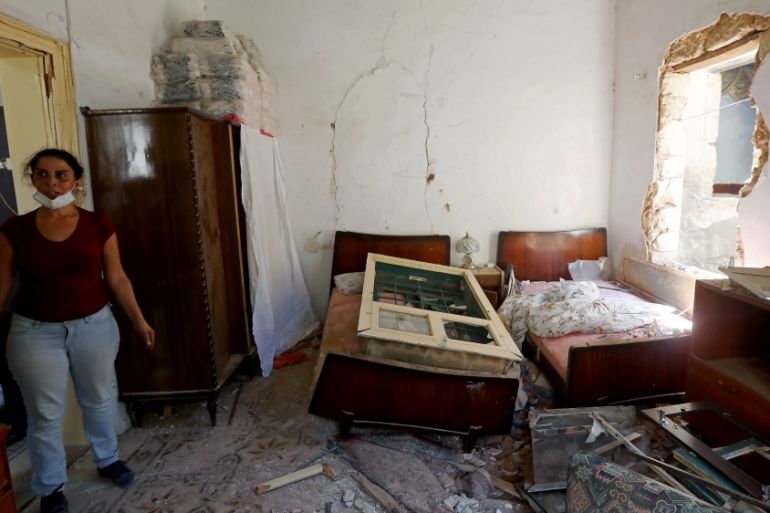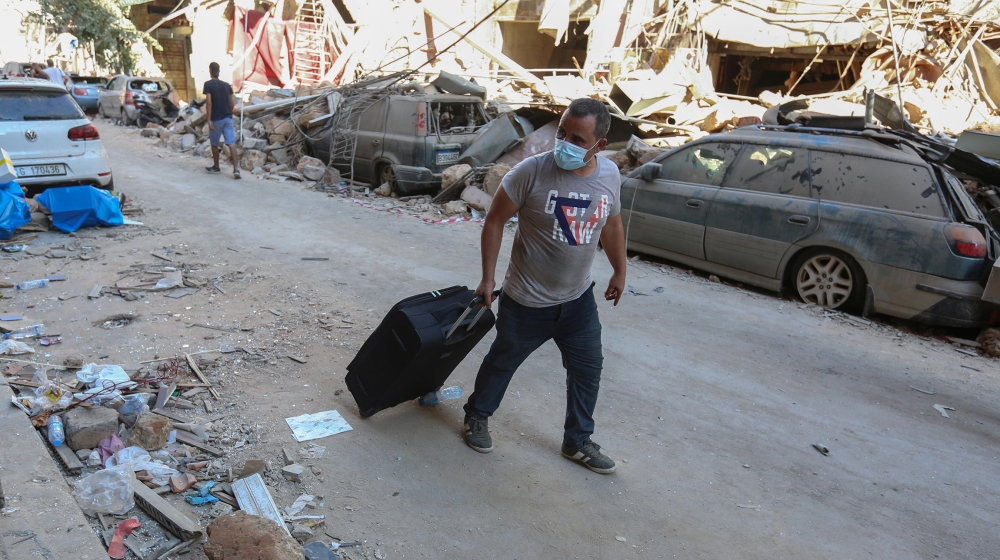Second night of uncertainty for 250,000 Beirut explosion homeless
As number of victims keeps rising, volunteers and social media users mobilise to offer shelter and aid to those in need.

Hundreds of thousands of people in Beirut are facing a second night of uncertainty following a massive explosion that destroyed their homes and prompted authorities to declare a two-week state of emergency.
Felt far beyond the Lebanese capital, the explosion on Tuesday in port warehouses storing ammonium nitrate displaced some 250,000 people and caused up to $5bn in damage, Governor Marwan Abboud told local media after taking a tour of the wrecked city.
Keep reading
list of 4 itemsParallel seasons: How Lebanon hides from reality
Lebanon’s FIBA World Cup journey is about much more than basketball
Justice for the Beirut blast can help avert Lebanon’s collapse
As of Wednesday evening, the confirmed death toll had topped 130 people, with some 5,000 others wounded.
Lebanese officials have pleaded to the international community to support a country already reeling from a major economic crisis and a surging coronavirus outbreak.
And while a number of countries have offered their support, the devastation has also spawned a flurry of domestic initiatives that have seen authorities, charities and social media users rushing to find shelters, food and water to those left without a home.
In just 24 hours, human rights group Impact Lebanon raised more than $2m in donations, while ThawraMap, an online platform originally used to identify locations for Lebanon’s anti-establishment protests, has been sharing a list of available shelters across the city.

The Lebanese Red Cross, meanwhile, set up temporary shelters with food, hygiene kits and basic needs across Beirut to house up to 1,000 families.
Activists such as Rawad Taha have launched online campaigns to collect money to build temporary shelters and fix damaged homes.
Social media users across the city also offered their support. Using the hashtag “OurHomesAreOpen” in both Arabic and English, people have been offering spare beds providing their names, phone numbers and location of the accommodation.
“Please DM me if you or anyone you know needs a shelter,” wrote Twitter user Joelle Eid.
If anyone needs or can offer shelter, please post it below. We are building a map with all shelters.https://t.co/nR5i6vaBDr#ourhomesareopen #بيوتنا_مفتوحة
— thawramap (@thawramap) August 4, 2020
In a limited time overnight over 1500$ have been collected across the globe, the goal is to reach 25000$, this small amount will be managed by myself and a group of activists to provide temporary shelter humanitarian aid to local communities. Keep sharing. https://t.co/veesX2mQL1
— Rawad Taha (@rawadtaha) August 5, 2020
Please DM me if you or anyone you know needs shelter. My family home was not affected and is open. We can arrange for transport as well. #ourhomesareopen #Lebanonexplosion
— Joelle Eid l جويل عيد (@joelleeid) August 4, 2020
The aftermath of the explosion has dealt a further blow to the already deep sense of frustration and anger among many Lebanese who took to the streets en masse last year to demand an overhaul of the country’s political system.
In recent months, Lebanon’s currency has plummeted against the US dollar, businesses have closed at an alarming rate and unemployment has rapidly increased, with almost half of the country now living below the poverty line.
Food is a major worry, too. Prior to the explosion, which also damaged silos storing much of the country’s grain, inflation of basic food goods soared by 109 percent between September and May.
“We fear that we will soon have a problem with the availability of flour for the country,” the Food and Agriculture Organization, a United Nations agency, said after the explosion.
|
|